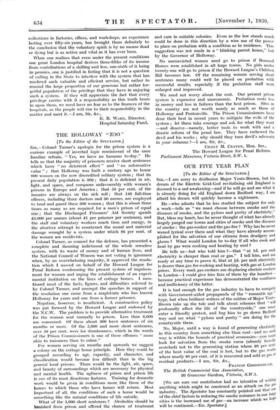OUR FIVE YEAR PLAN [To the Editor of the SPECTATOR.]
[To the Editor of the SPECTATOR.] am sorry to disillusion Major Yeats-Brown, but his dream of the Electric Grid-God revitalizing old England is doomed to a sad awakening—and if he will go and see what it is already doing for old England down Bedford way, I am afraid his dream will quickly become a nightmare.
He—who admits that he has studied the subject for only a week—tells us " we must choose between smoke and the diseases of smoke, and the pylons and purity of electricity." But, bless my heart, has he never thought of what has already largely purged our towns and cities of smoke and the diseases of smoke : the gas-cooker and the gas-fire ? Why has he never waxed lyrical over them and what they have already accom- plished for the salvation of our citizens from drudgery and gloom ? What would London be to-day if all who cook and heat by gas were cooking and heating by coal ?
He tells us—but who told him ?—that " at ld. per unit electricity is cheaper than coal or gas." I tell him, and am ready at any time to prove it, that at id. per unit electricity is dearer than gas for cooking and heating, with gas at London prices. Every week gas-cookers are displacing electric cookers in London—I could give him lists of them by the hundred— because practical experience has demonstrated the costliness and inefficiency of the latter.
It is bad enough for the gas industry to have to compete with Government-aided propaganda of the "romantic age" type, but when brilliant writers of the calibre of Major Yeats- Brown take up the tale and talk about schemes that " will profoundly affect the life of the countryside," one must enter a friendly protest, and beg him to go down Bedford way and see what " pylons and purity " are doing for the countryside there.
No, Major, until a way is found of generating electricity in this country from something else than coal—and no such way is within the bounds of practical economics—you must look for salvation from the smoke curse (already heavily scotched) not to the generating station where 80 per cent. of the heat value of the coal is lost, but to the gas works where nearly 80 per cent. of it is recovered and sold as gas or residual products.—I am, Sir, &c.,
FRANCIS GOODF-NOUGII. The British Commercial Gas Association, 30 Grosvenor Gardens, Victoria, S.W.'.
[We are sure our contributor had no intention of writing anything which might be construed as an attack on the gas industry. The Spectator has constantly pointed out that one of the chief factors in reducing the smoke nuisance in our large cities is the increased use of gas—an increase which we hope will be continued.—En. Spectator.]










































 Previous page
Previous page